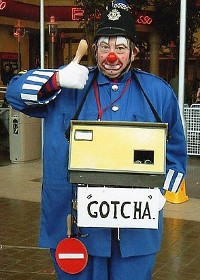Clown suits
Here's a pretty old post from the blog archives of Geekery Today; it was written about 16 years ago, in 2009, on the World Wide Web.
Here’s a snippet from a recent New York Times profile on Henry Louis Gates, the renowned Harvard professor of African-American studies, and Sergeant James Crowley, the stupid, belligerent, and violent Cambridge cop who stupidly arrested Gates on his own front porch, allegedly for committing disorderly conduct
in the foyer and front porch of his own home.
From 2 Cambridge Worlds Collide in Unlikely Meeting, in the New York Times, 26 July 2009:

Friends say he has a large circle of friends in Natick and in Cambridge, where he grew up. Sergeant Crowley plays on a men's softball team and coaches his daughters' softball and basketball teams.
I have always thought of him as the most noncop person that I know,said Andy Meyer, a friend who plays softball with him on a team named the Black Mariahs. Mr. Meyer's wife, Betsy Rigby, said:When he has the uniform on, Jim has an expectation of deference. But when he's not in uniform, he's just a regular guy.
Yes. Exactly. And therein lies the problem.
Sergeant James Crowley believes that putting on a uniform and a badge puts him above just-folks like you and me and Henry Louis Gates, and so that it entitles him to special treatment — to deference,
that is, willing subordination — that he would never think of demanding from his friends, his neighbors, or any other of his equals when he’s living life out of uniform, like any other just-a-regular-guy.
And that’s why, when he is in uniform, he’s willing to bully, browbeat, and physically coerce you into handcuffs and jail, just to violently punish you if you should dare to tell him off in your own foyer — because he stupidly believes that his work clothes entitle him to command, and to expect obedience from, people he doesn’t even know. That’s stupid. But typical: stupidity, violence and petty tyranny are in fact his line of work as he has been led to understand it. And when he showed up at Ware St., he was indeed just doing his job.
(Via Jacob Sullum @ reason 2009-07-29.)
Jive talk like this would lead to [Insert Here]’s finest being defenseless against great-grandmothers.
“when he is in uniform, he’s willing to bully, browbeat, and physically coerce you into handcuffs and jail, just to violently punish you if you should dare to tell him off in your own foyer — because he stupidly believes that his work clothes entitle him to command”
I’m not sure you can say he believes it entitles him. From personal experience in talking to police officers, I think a number of them feel that they “bully, browbeat, and physically coerce you into handcuffs and jail” as necessity under the law. Whether they believe it’s morally just or not is irrelevant. They’re trained (directly and indirectly) to turn off the logical and moral parts of their mind for the sake of the protecting the law.
Not to say that ‘just doing their job’ is any excuse for immoral acts.
Either he was aware what he did was wrong and he lacks integrity as a person, or he believes he was in the right and is therefor a controlling power-abusing pig, arresting a man for rightfully arguing against injustice.
Cerpin,
Well, we may just be disagreeing over words here, but my view is that the choice to carry out some action X involves an implicit commitment to the claim that there is not something decisively wrong with doing X under the circumstances. (If Crowley genuinely believed that it was wrong to arrest Gates, that he had no business doing so, he would not have done it; instead, he refuses to apologize, because he is convinced that what he did was within his rights.)
I think that cops who brutalize their reason and their conscience to the point that they’ll commit any atrocity in the name of forcing compliance with The Law do so, not because they are see that as immoral but don’t care, but rather because they (stupidly, and viciously) believe that The Law dictates what’s morally permissible, and that morality permits, or perhaps even demands, setting individual judgment aside in favor of obedience to The Law. The problem is not that they disregard morality in favor of legality; it’s that they believe that there isn’t any real difference between the two, or that the latter more or less unilaterally determines the content of the former.
I think you nailed here: the law or the process is conflated with the right way to do things, or with the way things have to be. Kind of like when illegal aliens are bad people because they didn’t come into the country “the right way”.
It’s silly that this belief is still influential, but maybe there is some doublethink going on, or maybe nationalist values have been drilled into people so well that certain authority is perceived as legitimate even though it wouldn’t be considered legit for another country to do the same things.
Discussed at littlealexinwonderland.wordpress.com /#
Daily Briefing — 30th-31st July 2009 « Little Alex in Wonderland:
Usually the “law” is said to embody the “Will of the People”, and is therefore right. I’m not sure which bothers me more…. the attempt to cover naked power by associating it with the will of the majority, or the implied claim that the will of the majority is the same as what’s right.